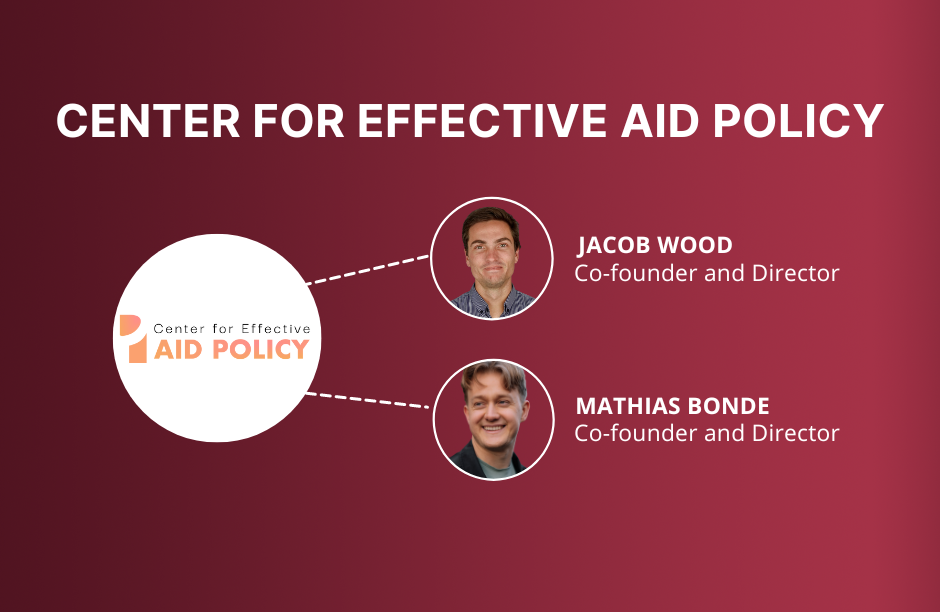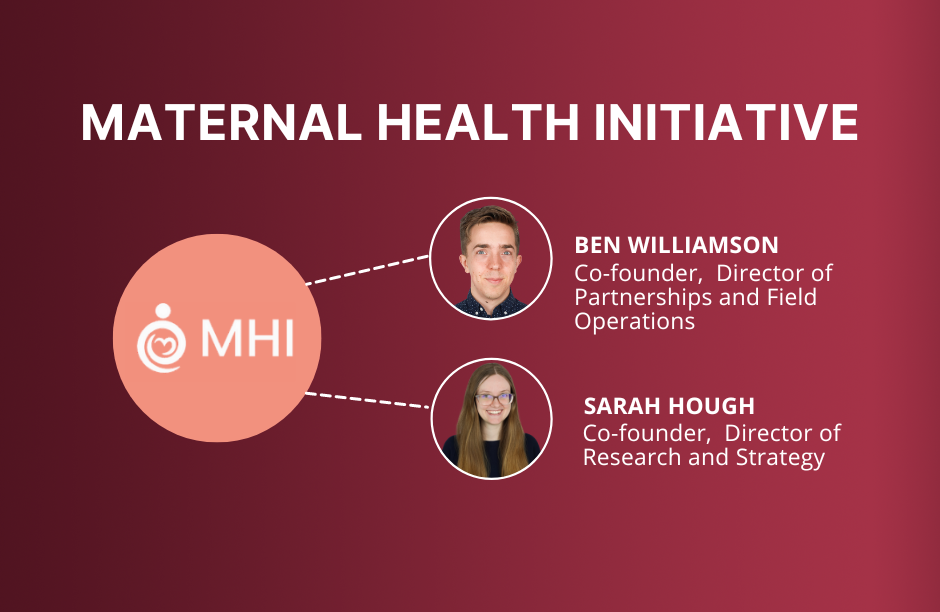Presenting: 2022 Incubated Charities (Charity Entrepreneurship)
By KarolinaSarek🔸, Joey🔸, Ambitious Impact @ 2022-12-08T18:12 (+293)

We are proud to announce that 5 new charitable organizations have been launched from our June-August 2022 Incubation Program. Nine high-potential individuals graduated from our two-month intensive training program. The Incubation Program has been designed to teach participants everything they need to know to launch and run an extremely effective, high-impact charity. From analyzing the cost-effectiveness of an intervention, all the way to crafting a proposal for funding, the program participants are equipped with the knowledge and confidence they need to see their chosen intervention become a reality. Eight have gone on to start new effective nonprofits focused on policy, mental health, family planning and EA meta cause areas, and one participant was hired by Charity Entrepreneurship as a Research Analyst. They will be joining our 2023 cohort.
Thanks to our generous CE Seed Network of funders, we have helped to secure $732,000 in funding for the organizations, and will further support them with mentorship, operational support, free co-working space in London, and access to a constantly growing entrepreneurial community of funders, advisors, interns and other charity founders.
The 2022 incubated charities are:
- Center for Effective Aid Policy- identifying and promoting high-impact development policies and interventions.
- Centre for Exploratory Altruism Research (CEARCH)- conducting cause prioritization research and outreach.
- Maternal Health Initiative- producing transformative benefits to women’s health, agency, and income through increased access to family planning.
- Kaya Guides- reducing depression and anxiety among youth in low-and middle-income countries.
- Vida Plena- building strong mental health in Latin America.
CENTER FOR EFFECTIVE AID POLICY

Co-founders: Jacob Wood, Mathias Bonde
Website: aidpolicy.org
Email address: contact@aidpolicy.org
CE incubation grant: $170,000
Description of the intervention:
The Center for Effective Aid Policy will work on identifying and advocating for effective solutions in aid policy. This may include:
- Increasing international development aid
- Increasing budget allocation to specific effective development programs
- Introducing new effective development interventions into aid budgets
- Revising processes which result in improved development aid effectiveness
Background of the intervention:
$179 billion was spent on development aid in 2021 - that is roughly 240x the amount of money that GiveWell has moved since 2009. While well-intentioned, there is a broad consensus among experts, think tanks, and implementing partners alike that aid effectiveness can be vastly improved.
The Center for Effective Aid Policy believes tractable interventions exist in the development aid space that will result in improved aid spending and better outcomes for its recipients. You can read more in their recent EA Forum post.
Near-term plans:
In 2022-2023, The Center for Effective Aid Policy will identify policy windows and formulate impactful and practical-to-implement policies, which they will advocate to governments and NGOs. They conservatively estimate their chances of advocacy success at $5.62 per DALY - more than an order of magnitude higher than multiple GiveWell-recommended charities.
CENTRE FOR EXPLORATORY ALTRUISM RESEARCH (CEARCH)

Founder: Joel Tan
Website: exploratory-altruism.org
Contact: https://exploratory-altruism.org/contact/
CE incubation grant: $100,000
Description of the intervention:
CEARCH conducts cause prioritization research and outreach - identifying the most important problems in the world and directing resources towards solving them, so as to maximize global welfare.
Background of the intervention:
There are many potential cause areas (e.g., improving global health, reducing pandemic risk, or addressing long-term population decline), but we may not have yet identified what the most impactful causes are. This is the result of a lack of systematic cause prioritization research.
- Existing cause research is not always fully systematic; for lack of time, it does not always involve (a) searching for as many causes as possible (e.g., more than a thousand) and then (b) researching and evaluating all of them to narrow down to the top causes.
- The search space for causes is vast, and existing EA research organizations agree that there is room for a new organization.
Near-term plans:
By the end of year one, CEARCH aims to have (a) identified 1000 causes, (b) narrowed down on a cause that is at least 10x more cost-effective than top GiveWell charities, and (c) secured informal agreements from three major EA organizations to use their future research. CEARCH plans to achieve this by:
- Carrying out a comprehensive search process (e.g., using existing lists, conducting consultations and surveys, performing outcome tracing) for candidate causes.
- Conducting research to narrow down on causes. Each cause is subject to an initial shallow research round of one week of desktop research. If the cause's estimated cost-effectiveness is at least one magnitude greater than a GiveWell top charity, it passes to the intermediate research round of two weeks of desktop research and expert interviews. Then, if the cause's estimated cost-effectiveness is still at least one magnitude greater than a GiveWell top charity, it passes to the deep research round of four weeks of desktop research, expert interviews, and commissioning of surveys and quantitative modeling.
- Outreach to important EA organizations, members of the community on the EA forums and at EA conferences, and to non-EA organizations, particularly in the political sphere.
MATERNAL HEALTH INITIATIVE (MHI)

Co-founders: Ben Williamson, Sarah Hough
Website: maternalhealthinitiative.org
Email: info@maternalhealthinitiative.org
CE incubation grant: $220,000
Description of the intervention:
Maternal Health Initiative (MHI) aims to reduce rates of maternal mortality and provide women with fundamental increases in their agency by expanding access to family planning.
Background of the intervention:
Lack of contraceptive access is a significant issue with a broad range of negative consequences. 218 million women in low- and middle-income countries (LMICs) do not have access to modern contraceptives, resulting in over 70 million unintended pregnancies each year. Beyond the clear consequences unintended pregnancies have on people’s autonomy, around 300,000 women and girls die of pregnancy-related complications each year. More than two-thirds of these deaths occur in sub-Saharan Africa, where the Maternal Health Initiative will work.
Increased contraceptive access allows women and their families greater agency over a significant life decision, with clear benefits for women’s health, income, and educational outcomes. Furthermore, family planning interventions have been recognised as highly cost-effective, with the Copenhagen Consensus estimating that every dollar invested in family planning leads to $120 in social, economic, and environmental benefits.
Near-term plans:
In October, MHI conducted a scoping visit to Ghana. There they met with 18 different stakeholders, including local NGOs, potential partner organizations, and healthcare providers. MHI is currently exploring the potential of a pilot intervention improving the quality and reach of postpartum (post-birth) family planning counseling. The organizations is using a combination of research into the published literature, cost-effectiveness analyses (CEAs), and conversations with stakeholders and experts to ensure that the chosen intervention is cost-effective, impactful and scalable. This includes conducting a geographic assessment to choose the location of the pilot, incorporating factors such as maternal mortality rates, unmet need for contraception, and the extent of work by existing actors in the field.
MHI intends to run a short proof of concept in early 2023 to test their program before running a full pilot in mid 2023. Alongside this, they will continue to develop engagement with other actors and stakeholders in the family planning space, building on the contacts established through their scoping trip to Ghana.
KAYA GUIDES

Co-founders: Rachel Abbott, Shen Javier (Incubation Program 2021)
Website: kayaguides.com
Email: hello@kayguides.com
CE incubation grant: $110,000
Description of the intervention:
Kaya Guides aims to reduce depression and anxiety among youth in low-and middle-income countries through a guided self-help program delivered by WhatsApp. Participating youth will complete a digital learning program in which they complete self-help material independently and have brief weekly calls with a lay counselor over the course of 5-10 weeks. A meta-analysis of 26 RCTs demonstrates that this format has comparable effects to face-to-face therapy in reducing depression and anxiety- even when counselors have no health background and calls are as short as 15 minutes per week.
Background of the intervention:
Nearly 1 billion people today live with a mental disorder. Despite the severity of the problem, mental health is extraordinarily neglected. Governments spend just 2% of their healthcare budgets on mental health. In low-and middle-income countries, 75% of people who need treatment do not get it.
Guided self-help presents a highly evidence-based way to improve mental health. Over 50 RCTs show that self-help has medium to large effects on depression, anxiety, and subjective well-being. This strong evidence base is paired with high cost-effectiveness. The team estimates that at scale, Kaya Guides could be 45x more cost-effective at improving subjective well-being than direct cash transfers in LMICs. They estimate that the marginal cost of helping an additional person will be as low as $3.93.
Near-term plans:
To date, the Kaya Guides team has completed a thorough geographic assessment, selected India as their focus country, honed the design of their intervention, built out a team of advisors, and formed strategic relationships with actors in the mental health sector in LMICs. Co-founders are currently participating in a mental health leadership course run by India’s leading mental health organization. Through the course, co-founders are being trained in research-backed methodologies for designing and scaling mental health interventions in LMICs, particularly in India’s context.
In early 2023, co-founders will conduct a scoping trip to two cities in India to meet with mental health nonprofits, therapists, youth organizations, and other stakeholders. They will conduct focus groups discussions and user interviews to gain an in-depth understanding of the realities of Indian youth. Based on this research, the team will work with local experts to co-design evidence-based self-help content, including audio, video and written material. They will adapt the program to WhatsApp, conduct beta testing to confirm user acceptability and comprehension, and set up a clinical review. Kaya Guides will run a full pilot to test the program’s efficacy by the end of the year. They will use pilot results to adapt the program and prepare for full program rollout in 2024.
VIDA PLENA

Co-founders: Joy Bittner, Anita Kaslin
Website: vidaplena.global
Email: joy@vidaplena.global / anita@vidaplena.global
CE incubation grant: $132,000
Description of the intervention:
Vida Plena (meaning ‘a flourishing life’ in Spanish) provides evidence-based depression treatment to Ecuadorian communities at scale.
Vida Plena is the first EA-aligned mental health organization based in and operating within Latin America.
Vida Plena empowers local people to deliver a cost-effective model of counseling. Community members are trained to treat depression through Group Interpersonal Therapy (g-IPT).
Background of the intervention:
The WHO estimates that 5% of people in Latin America have depression; however, a lack of prioritization means that more than three out of four people in Latin America go untreated. Ecuador, in particular, has some of the highest rates of depression in the region: causing 8.3% of the total years lived with disability (YLD).
Vida Plena addresses the lack of treatment for depression by empowering local people to deliver a cost-effective model of counseling. Community members are trained to treat depression through Group Interpersonal Therapy (g-IPT), which is the World Health Organization’s top recommended intervention for depression in low-income settings.
In terms of improving subjective well-being, we estimate Vida Plena to be at least at least 8x more cost-effective than GiveDirectly.
Near-term plans:
Starting in Ecuador, Vida Plena aims to replicate the successes of Strong Minds (which also uses Group Interpersonal Therapy) throughout Latin America. Strong Minds is recommended by Founders Pledge and is also the Happier Lives Institute’s top charity recommendation.
Vida Plena launched in the fall of 2022, with a pilot program training 11 community members as support group facilitators, and is collecting data to measure impact.
In 2023, they are planning to expand throughout Ecuador, effectively treating depression in over 1,600 people.
Depending on funding,Vida Plena is also planning on conducting a RCT in collaboration with Columbia University to evaluate the effectiveness of Group Interpersonal Therapy as applied in Latin America. The results of these studies will be published in peer-reviewed, academic journals to build the publicly available knowledge base regarding effective mental health treatments in low-and middle-income countries.
JOIN THE INCUBATION PROGRAM IN 2023
We are building upon our past successes and scaling up to two incubation programs in 2023, with the hope of launching even more high-impact charities. Applications are now closed for the February/March program but if you are interested in attending our June/ August Incubation Program in 2023, you can sign up here to be notified when we start accepting applications.
vmasarik @ 2022-12-09T14:49 (+9)
Thank you for the detailed post!
Could you explain a bit further the case for "CENTRE FOR EXPLORATORY ALTRUISM RESEARCH (CEARCH)"? I believe I might have misunderstood something, or missed some details.
The linked report talks about Rethink Priorities, and Open Phil already doing research in this area, but at the same time it is explained that this area is currently "Very neglected". In this post you also write that the plan is to
(a) identify 1000 causes, (b) narrowed down on a cause that is at least 10x more cost-effective than top GiveWell charities
I am sincerely very happy that there are more people coming into this area, as I believe the requirements and dedication necessary for joining Open Phil is rather high, and having people who are not 95% perfect, yet still doing research in this area would be still valuable.
However, isn't it a bit too confident that CEARCH would identify a 1000 causes that RP or OpenPhil couldn't find? To me it just seems so counter intuitive where OpenPhil / RP wouldn't hire people for this, but somehow making a new organization makes sense? Or at least where is this confidence coming from? Is it really beneficial to start a new organization, compared to just joining the already existing ones?
Truly my only wish is to fully understand so that I can focus my personal goal into areas that need support. Thank you again!
Vlad
Joey @ 2022-12-12T10:53 (+9)
Hey Vlad,
I would definitely expect some of those 1000 ideas to have been researched by Open Philanthropy or Rethink; a long list like that would include both researched and un-researched areas. I think new nonprofits often come at things with a different angle, e.g., ways of weighting evidence, or tweaks in ethical views or baseline assumptions. For example, GiveWell is both highly well-run and huge, but they would not come to the same considerations that HLI has come to by looking at subjective well-being. I think the same thing will happen with CEARCH; there are lots of areas that might be missed by other actors but that would be picked up by a more systematic search done at a lower level of depth per area.
Jason @ 2022-12-10T00:14 (+9)
I'm guessing someone involved with CEARCH will answer, but it seems that putting all the eggs in the RP and OP baskets would be undesirable. No matter how good an organization is, it will have its tendencies, blind spots, etc. So there would seem to be value in having a number of different orgs doing cause exploration which will hopefully not have the same tendencies/blind spots/etc.
Yonatan Cale @ 2022-12-09T14:49 (+7)
WOW
Yonatan Cale @ 2022-12-11T13:30 (+8)
Explaining (since someone downvoted and I'm self conscious now) :
I upvoted the post because I'm happy orgs like CE publish updates.
In addition to that, I commented WOW since there were no comments so far, and I wanted to express that I think these charities sound really promising, maybe even a step up for global health and wellbeing interventions in EA
Jasper Meyer @ 2022-12-14T17:28 (+5)
I just wanted to say it’s really heartening for me to know that there’s so much good work going into aligning intl aid with the priorities of its recipients. As many have noted on this forum in the past few months, the potential for impact here is massive. Thank you!
Miguel Lima Medín @ 2022-12-09T19:00 (+5)
Congratulations! Great job by CE and all these founders.
I’m impressed by the “sodium taxation policy advocacy to control hypertension to be 190,927 DALYs per USD 100,000, which is around 300x as cost-effective as giving to a GiveWell top charity” cited in the Centre for exploratory altruism research site.
Joel Tan (CEARCH) @ 2022-12-14T16:14 (+3)
To be fair, estimated cost-effectiveness will go down (and potentially drastically) as we do deeper research (as we plan to!). Empirically, shallower research almost always overstates the case - and theoretically, it's simply because the cost-effectiveness estimates that happen (by random chance) to be overestimates, will also tend to survive to later stages of the research process.
To the extent that we should be optimistic about the hypertension results, it's because (a) 300x is a big cushion, and a long way to fall while still being cost-competitive or better than AMF et al, and (b) this is in line with our priors about the high cost-effectiveness of various health policy advocacy interventions (e.g. alcohol/tobacco taxation, road traffic safety, lead regulation etc).
Miguel Lima Medín @ 2022-12-15T17:33 (+1)
When we believe that policy advocacy interventions are highly cost-effective, are we considering the end-to-end costs or only the first link in the chain?
As an example, for road-safety, are we counting A or B?:
- Salary costs of a group of people spending their time to convince the authorities to pass a law limiting speed
- Costs in “A” + costs of writing and publishing the law + costs of communicating about the new law in the media + costs of changing the speed limit signals, etc.
If this is the case, then advocacy will allways be the most cost-effective option. As long as you have a small probability to convince the government, it will allways be cheaper to convince someone else to fix an issue with their money than spending your money to fix the issue.